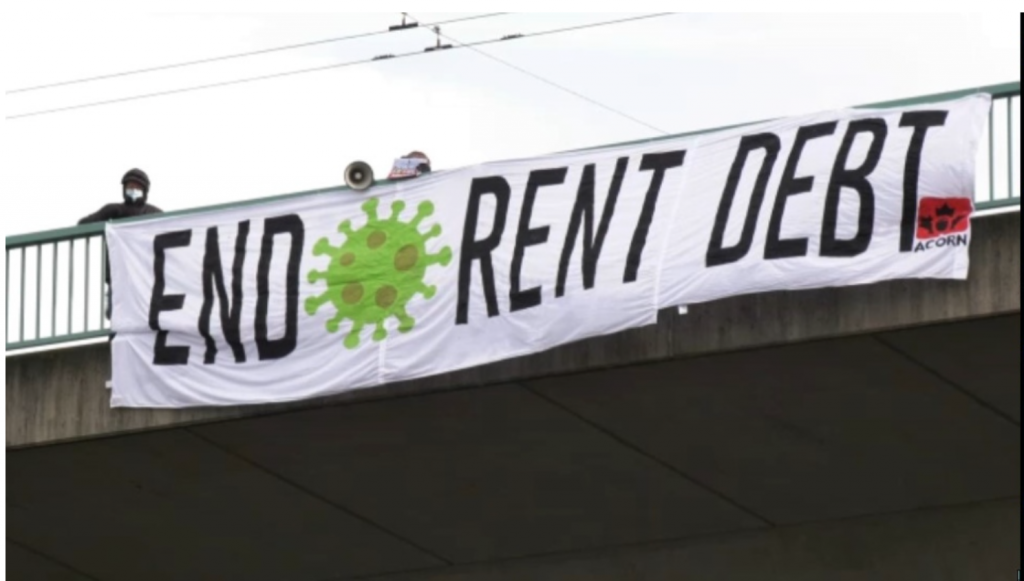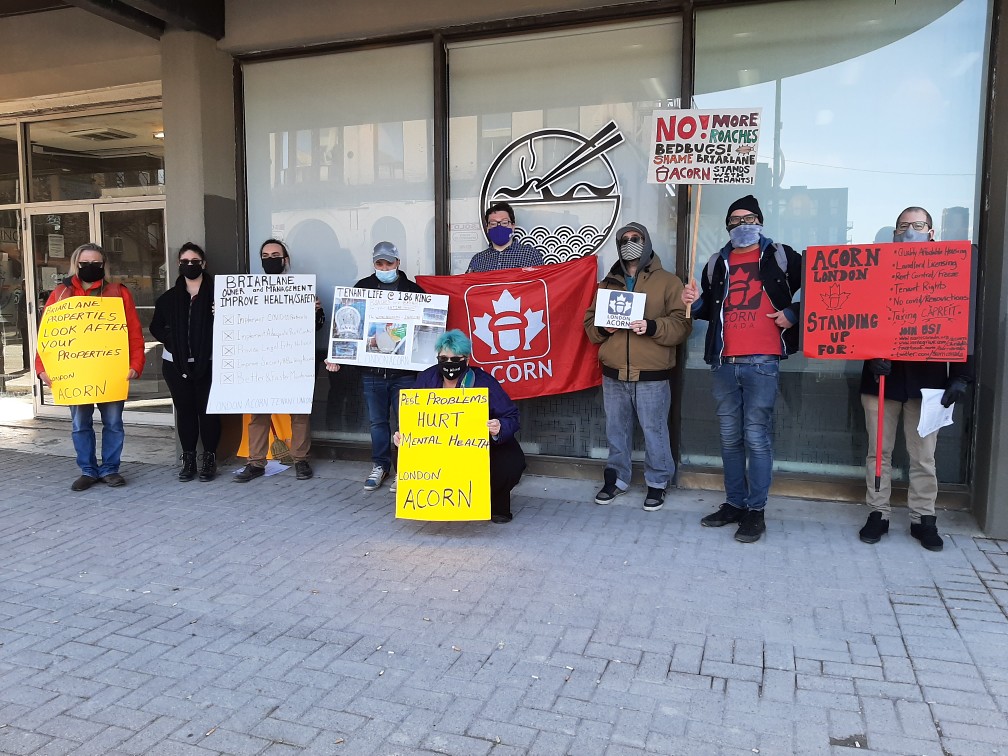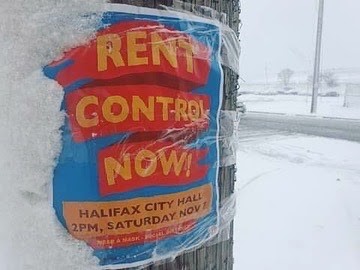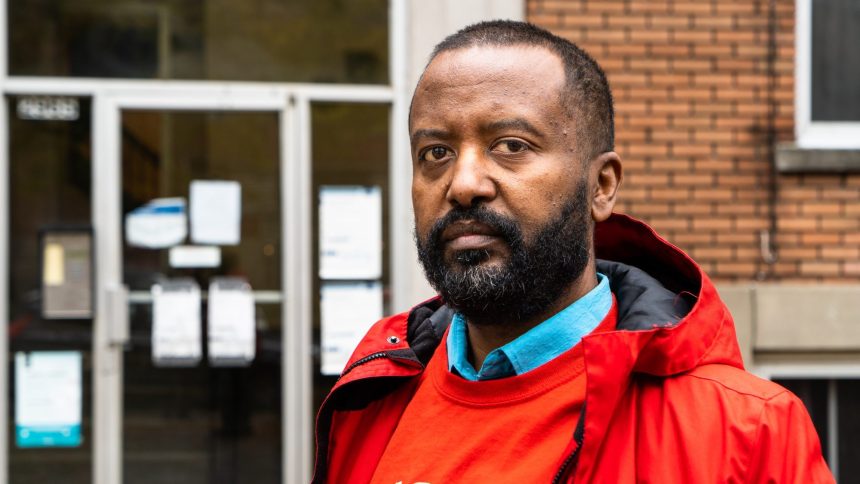Your cart is currently empty!
Category: ACORN Canada
ACORN Canada: Big Win on Predatory Loan Campaign

One of ACORN Canada’s long-standing and hard-fought campaigns against predatory lending got a huge boost recently upon the release of the 2021 Budget.
The government has agreed to a consultation on the lowering of the federal interest rate, which has the potential to lower the NSF fee attached to predatory lending.
To find out more about what this means for ACORN Canada — as well as read their full response to the release of the 2021 Budget — check out their posting here.
New London advocacy group says a third of renters live in substandard conditions

A housing group that lobbies on behalf of low and middle-income renters has learned from a recent survey that one third of respondents are living in sub-standard conditions in London.
ACORN Canada, a national grassroots organization which opened a chapter in London, Ont. in October, has been surveying renters in the city.
Sarah Henke was one of the 72 people to respond. She lives with her husband in a two-bedroom unit in a five-building high rise apartment complex at 520 Mornington Ave., in east London.
“It’s a bit of a gong show,” she said of the complex that is operated by Sterling Karamar.
“Maintenance requests do not go answered. I’ve had a maintenance request for my tub that doesn’t drain since November 10th and a maintenance request in for my sink that doesn’t drain since November 18th,” Henke said.
CBC News has made multiple attempts to contact Sterling Karamar but has yet to receive a response.
Henke has lived in the unit for seven years and pays $1,000 a month, including hydro, which is below market value in London.
“My husband and I have actively considered leaving and have looked but we can’t afford anywhere else in the city.”
Henke said a comparable apartment today would cost $1,400 a month, plus parking and utilities, which is why she says she puts up with the living conditions.
“The building itself is infested with [cock]roaches. So regardless of what unit gets treated — because the whole building is so infested — it’s just a losing battle,” she said.
Similar complaints
ACORN London leader, Nawton Chiles, who is also a philosophy student at Huron University College, hears stories like Henke’s too often.
He’s been taking stock of survey responses and sees patterns that he hopes the lobby group can address.
“The number one thing that people are complaining about is that the rent is too high. We’ve got almost 75 percent of tenants saying that,” said Chiles. “But the second most popular concern is that repairs and maintenance never get done and that the housing condition is poor to begin with.”
A third of respondents said their conditions were substandard.
Henke, and ACORN London believe one solution is for the city to license landlords.
“What we’re asking the city to do is to license all new and existing rental units in a publicly accessible database,” Chiles explains, emphasizing the importance of random, annual inspections.
Chiles said that would strengthen property standards, “so that a landlord could be fined for repeated infractions, have their license revoked, if they continue to provide substandard housing.”
“We need accountability. These landlords have gone unchecked for so long,” Henke said.
Tenant Advocacy Group Arrives In N.B.
A national tenancy advocacy group has established a New Brunswick chapter.
ACORN New Brunswick will join previously established chapters in British Columbia, Toronto, and Nova Scotia.
Their first goal is to push Blaine Higgs’ PC government toward reinstating the eviction ban that was rolled back last spring.
“There are so many people facing economic pressures in their personal lives, and the government as of now hasn’t really done anything to accommodate that,” said Raven Blue, an organizer with the new chapter.
The newest ACORN chapter has released a petition calling on Higgs’ government to freeze evictions through the COVID-19 pandemic.
Blue says the Higgs government doesn’t understand the issues many New Brunswickers are facing during the Public Health emergency.
“The government has not shown interest in protecting people during a pandemic when you have exceptional market pressures that are causing rent increases to spike,” he said. “People are being evicted, and so my sense is they are not really aware of the issues. They are more interested in enabling gentrification in our communities, rather than helping tenants or people at risk.”
Blue says he’s noticed changes in the rental market provincially and locally over the past five years, and he himself has been evicted under what he called questionable circumstances.
“It’s a widespread issue where housing market pressures are taking advantage of very low tenant protections in New Brunswick,” said Blue.
While many have called for rent control in the province, similar to what Nova Scotia’s government rolled out in late 2020, Blue says it isn’t a cure-all for the issues faced by tenants here.
In provinces like Quebec, Blue says tenants have 21 days to pay off late rent, and then receive a tribunal hearing. But in New Brunswick, tenants can be evicted after just seven days without paying rent with no recourse.
“In New Brunswick it’s among the worst in Canada, the triggers for eviction,” said Blue. “So if you can easily evict a tenant then rent controls don’t really matter a great deal. You can evict somebody and just name your price for the rent.”
Banner drop on Cambie Bridge calls for rent debt forgiveness in B.C.

From CTV News Canada:
VANCOUVER — On Saturday, advocates dropped a banner off the Cambie Bridge in Vancouver calling for rent debt forgiveness.
BC ACORN, an advocacy organization, said the banner drop was an effort to escalate its campaign to end rent debt caused by the COVID-19 pandemic.
“Many of the people that lost income because of the pandemic restrictions also found themselves unable to afford rent and buy enough food,” said ACORN’s housing advocacy spokesperson Murray Martin in a news statement.
The white banner read “end rent debt” and included an illustration of the coronavirus.
Specifically, the group wants the B.C. government to reinstate the moratorium on evictions, end rent debt and enact vacancy rent control – a type of rent control attached to homes that prevents landlords from hiking the rental rate when a tenant leaves.
“(ACORN) hopes that by showing broad support for ending COVID rent debt (it) will convince (its) old housing ally David Eby that something needs to be done,” reads the news statement.
The organization says it will be meeting with Eby, B.C.’s Housing Minister and Attorney General, next week.
“David Eby used to come and speak at housing forums we held before he was elected. He was always showing unequivocal support for the cause. We hope he hasn’t changed too much” said ACORN member Peter Gardner in the statement.
London ACORN members take on Briarlane Rental Property Management
From London ACORN:
On Saturday November 28th, London ACORN members and tenants of 186 King Street who have been silently living with pest infestations and lack of maintenance and repairs, held a tenant speakout. Their landlord, Briarlane Rental Property Management, who boasts of owning and managing rental portfolio across Ontario, has been extremely negligent. Tenants need a management that responds to them. Currently, there are no standard office hours when tenants can approach them to get any issue resolved. On top of that, they enter tenants’ units without proper notice! There are even reports that a senior died of heat during summer as the building lacks proper heat/cold conditions. ACORN members and tenants decided to speak out against their landlord to highlight the issues they have been facing.
Close to 20 people joined the action. The action was led by London ACORN leaders. Members were joined by the NDP MPP Terence Kernaghan.
Tenants are demanding that:
- The landlord takes urgent action to do the necessary repairs and maintenance.
- There is a pest management plan which is carried out in a timely manner.
- There is staff and resources available in the building to do general maintenance and repair.
- The building follows COVID-19 related health protocols.
- The City of London needs to take immediate action to ensure that there is greater landlord accountability.
We haven’t still heard from the Property Management Company & Owner – Briarlane but we will keep the fight on!

Residents of Manor Village to rally outside city hall Wednesday
Leaders from the Ottawa advocacy group Association of Community Organizations for Reform Now (ACORN), along with impacted tenants of Manor Village, in Nepean, will be gathering outside Ottawa City Hall this week, in an effort to prevent the community from being demolished to make way for a future light rail transit (LRT) station.
As part of the Stage 3 LRT planning, city staff recommended that 120 units of low-income housing be demolished, in order to build the future Knoxdale LRT Station. The move would force the eviction of over 300 low-income and working class families.
According to a statement from ACORN, city staff say tenants will have multiple years to find a new home if the city goes forward with the plan, but residents are concerned they will be unable to find somewhere as affordable as Manor Village, given the rising cost of rent in Ottawa.
ACORN leaders, along with affected tenants, will be gathering outside city hall at 9 a.m. on Wednesday, November 25.
Tenant Actions in Nova Scotia
From ACORN Canada: This has been an explosive week for the Rent Control Now campaign in Nova Scotia! Over the past few months ACORN has been collecting rent increases from across the province. The results are grim but not shocking, members have gotten increases upwards of $900 a month.
One rent increase went viral over social media, Grace – a tenant who works at the local gas station – got a $650 increase designed to force her to move from her apartment so the landlord can renovate the unit. The response from the Province? Rent Control doesn’t work. According to the provincial government it’s a “philosophical issue” – try telling that to Grace and the hundreds like her who are forced from their homes by greedy landlords!
Since then tenants have been coming forward with their stories and ACORN has been more active than ever, getting tenants rallied, sending hundreds of emails to Stephen McNeil and local MLAs, and pushing the province closer to rent control. We are organizing a rally Saturday (Facebook event here) – with upwards of 1500 people from across the HRM interested in coming – to force the province to act in the best interest of tenants and enact Rent Control Now! Can’t make it? Click here to send an email to your MLA to demand Rent Control!

PRESS:
CTV News: ‘It’s ridiculous’: Calls for affordable housing in Halifax area grow louder (with video!)
Nova Scotia Advocate: News brief: We need rent control and landlord licensing everywhere in Nova Scotia
The Chronicle Herald: Rally calling for rent control in Nova Scotia to be held Saturday in Halifax
Global News: Habitat for Humanity pushes for more affordable housing options in the HRM
Tenant Organizing in Montreal
ACORN Canada is organizing to support tenants who are being forcibly evicted by their landlord due to repairs and renovations on the buildings. Organizers say that it is the responsibility of the landlord to find accomodations for these tenants.
“We are in the midst of a pandemic, there is no room to rent and it is expensive! We ask them to leave when Montreal is in code red and we are told not to leave home! ” says Theodros Wolde of ACORN Canada.
Read the full post (in French) from ACORN Canada.

ACORN Surrey Disability Assistance Action

Members of the ACORN group chose a pedestrian overpass in Surrey for a “banner drop” on Wednesday (Oct. 14), in a call for increases to disability and income assistance in B.C. “PWD = Poverty,” read the banner, referring to persons with disabilities.
The “drop” happened at the intersection of Scott Road and King George Boulevard. ACORN is calling for rates to be increased to $2,000 per month to match the new federal benefits for low-wage workers, group member Bertha Edward told the Now-Leader. “If the federal government determined low-wage workers are entitled to a basic standard of living at $2,000 a month through Canadian Recovery Benefit and Employment Insurance, how is it justifiable that the B.C. government forces people on disability and income assistance to live below the poverty line?” the group said in a news release. “We live in a rich province and there is no excuse for people to live in poverty,” Tabitha Naismith, chair the Newton ACORN branch, said in the release.
Online, ACORN is at acorncanada.org. The website describes ACORN Canada as “an independent national organization of low and moderate income families with 130,000+ members in 20+ neighbourhood chapters across 9 cities.”
The post-pandemic future: Affordable Internet will become a universal human right
Alejandra Ruiz Vargas, national leadership representative for ACORN Canada, says that internet will become a universal human right in a post-pandemic world.
“People need connectivity for practical reasons, like finding jobs, getting government benefits and doing homework, as well as accessing entertainment and keeping in touch with loved ones,” she writes. “In 2016, the United Nations declared Internet access a human right, but even in Canada, around half of low-income families don’t have access to high-speed Internet at home. Of course, during Covid, this crisis only got worse.”
